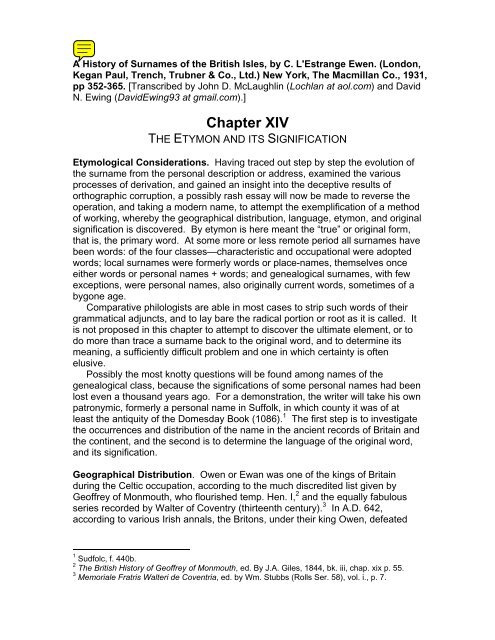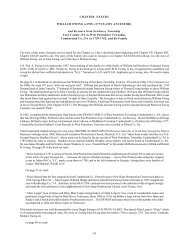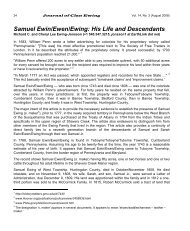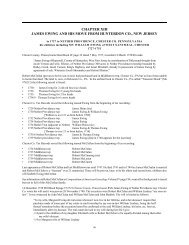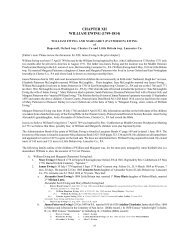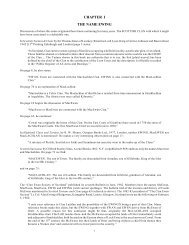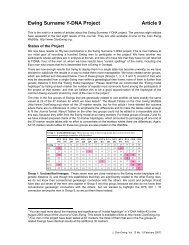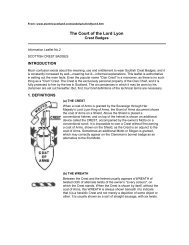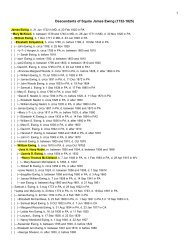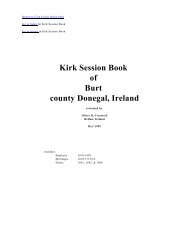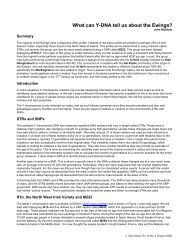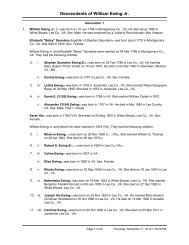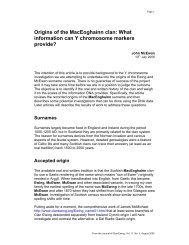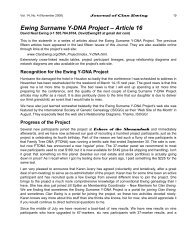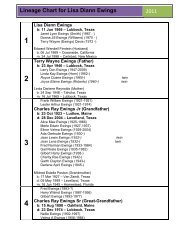Chapter XIV - Ewing Family Association
Chapter XIV - Ewing Family Association
Chapter XIV - Ewing Family Association
You also want an ePaper? Increase the reach of your titles
YUMPU automatically turns print PDFs into web optimized ePapers that Google loves.
A History of Surnames of the British Isles, by C. L'Estrange Ewen. (London,<br />
Kegan Paul, Trench, Trubner & Co., Ltd.) New York, The Macmillan Co., 1931,<br />
pp 352-365. [Transcribed by John D. McLaughlin (Lochlan at aol.com) and David<br />
N. <strong>Ewing</strong> (David<strong>Ewing</strong>93 at gmail.com).]<br />
<strong>Chapter</strong> <strong>XIV</strong><br />
THE ETYMON AND ITS SIGNIFICATION<br />
Etymological Considerations. Having traced out step by step the evolution of<br />
the surname from the personal description or address, examined the various<br />
processes of derivation, and gained an insight into the deceptive results of<br />
orthographic corruption, a possibly rash essay will now be made to reverse the<br />
operation, and taking a modern name, to attempt the exemplification of a method<br />
of working, whereby the geographical distribution, language, etymon, and original<br />
signification is discovered. By etymon is here meant the “true” or original form,<br />
that is, the primary word. At some more or less remote period all surnames have<br />
been words: of the four classes—characteristic and occupational were adopted<br />
words; local surnames were formerly words or place-names, themselves once<br />
either words or personal names + words; and genealogical surnames, with few<br />
exceptions, were personal names, also originally current words, sometimes of a<br />
bygone age.<br />
Comparative philologists are able in most cases to strip such words of their<br />
grammatical adjuncts, and to lay bare the radical portion or root as it is called. It<br />
is not proposed in this chapter to attempt to discover the ultimate element, or to<br />
do more than trace a surname back to the original word, and to determine its<br />
meaning, a sufficiently difficult problem and one in which certainty is often<br />
elusive.<br />
Possibly the most knotty questions will be found among names of the<br />
genealogical class, because the significations of some personal names had been<br />
lost even a thousand years ago. For a demonstration, the writer will take his own<br />
patronymic, formerly a personal name in Suffolk, in which county it was of at<br />
least the antiquity of the Domesday Book (1086). 1 The first step is to investigate<br />
the occurrences and distribution of the name in the ancient records of Britain and<br />
the continent, and the second is to determine the language of the original word,<br />
and its signification.<br />
Geographical Distribution. Owen or Ewan was one of the kings of Britain<br />
during the Celtic occupation, according to the much discredited list given by<br />
Geoffrey of Monmouth, who flourished temp. Hen. I, 2 and the equally fabulous<br />
series recorded by Walter of Coventry (thirteenth century). 3 In A.D. 642,<br />
according to various Irish annals, the Britons, under their king Owen, defeated<br />
1 Sudfolc, f. 440b.<br />
2 The British History of Geoffrey of Monmouth, ed. By J.A. Giles, 1844, bk. iii, chap. xix p. 55.<br />
3 Memoriale Fratris Walteri de Coventria, ed. by Wm. Stubbs (Rolls Ser. 58), vol. i., p. 7.
and slew the Scottish monarch, Domnall Breac, in the Battle of Strathcarn. 4 A<br />
seventh-century royal genealogy mentions a form of the name twice—Riderch<br />
map Eugein map Dunnagual map Teudebur map Beli map Elfin map Eugein map<br />
Beli. 5 In the reign of Æthelstane, the Strathclyde Britons joined with the Scots<br />
and Norsemen in an attempt to overthrow the English supremacy; but were<br />
defeated at Brunenberg, A.D. 937, and Owin, king of the Cumbrians, and<br />
Constantin, king of Scots, put to flight. 6 Owen is also called king of Gwent (Uwen<br />
Wenta cyning), 7 and is evidently the Eugenius sub regulus who in 931 attested a<br />
grant of King Æthelstan to the thegn Ælfric, of land at Watchfield (Berks); also<br />
appearing as a witness to further royal deeds, in one of which, by king Eadred to<br />
the thegn Ælfsige Hunlafing, gifting land at Alwalton (Hunts), he is called<br />
Wurgeat, and in another, a Saxon charter, Owen. 8 In A.D. 1018, the second year<br />
of Knut, king Malcolm entered England accompanied by Eugenius Calvus (the<br />
bald), king of the Strathclyde Britons (rex Clutinensium), gaining an important<br />
victory over the Northumbrians. 9 Owen probably died about the same time, as<br />
the Annales Cambriæ record under year 1015—Owinus filius Dunawal occisis<br />
est; the discrepancy in date being due, no doubt, to the Chronicler’s error.<br />
Beda, the Venerable, writing of a period four years before his own birth (673),<br />
mentions Owin of Lastingham (Yorks), who came with Queen Etheldreda from<br />
East Anglia. 10 The Rev. Dr. Stukely suggested that he was in all probability of<br />
native extraction, “for the Isle of Ely was possessed by the old Britons long after<br />
the Saxons had taken hold of England; as before was the case in Roman<br />
times.” 11<br />
The names Owein and Ewen frequently occur in early Welsh poems; the Book<br />
of Taliessin mentions Owein mon (of Mona) and Owen ap urien; and the Book of<br />
Aneurin, Ewein vap eulat (the son of Eulad). 12 According to the Welsh triads it<br />
appears that the Roman emperor Maximus (fifth century) left a son in Britain<br />
called Owain ab Macsen Wledig, who was elected to the chief sovereignty of the<br />
Britons, and under whom Britain was restored to a state of independence, and<br />
4 Annals of Tighernac and Annals of Ulster. His name is variously spelt Ohan, Hoan, and Haan,<br />
the h being redundant. See Celtic Scotland, by W.F. Skene, vol. I, p. 250, and Chronicles of the<br />
Picts and Scots, by the same author, p. 68. See also Four Ancient Books of Wales, vol., i, p. 178.<br />
5 Additions to the Historia Britonum (Chronicles of the Picts and Scots, p. 15).<br />
6 Under the year 934 Historia Ecclesiæ Dunhelmensis (Symeon of Durham), Rolls Ser. 75, vol. i,<br />
p. 76. Under year 926 Eugenius Rex Cumbroram submits to Æthelstan at Dacre. Willelmi<br />
Malmesbiriensis Monachi de Gestis Regum Anglorum, edited by W. Stubbs (Rolls Ser. 90), vol. ii,<br />
p. 147.<br />
7 Anglo-Saxon Chronicle (Rolls Ser. 23), vol. i, p. 199, col. i. Gwent was the name given to<br />
territory principally consisting of the counties of Monmouth and Glamorgan.<br />
8 Latin and Anglo-Saxon grants from Codex Diplomaticus Aevi Saxonici, by J. M. Kemble, vol. ii,<br />
pp. 203, 304; vol. v, pp. 199, 208.<br />
9 Symeon of Durham (cited above), vol. ii, p. 156. Professor Freeman calls him Eogan or<br />
Eugenius, and Dr. Skene (Celtic Scotland, vol. i. p. 394), Eugenius or Owen.<br />
10 Ecclesiastical History of England, bk. iv, chap. iii.<br />
11 The History and Antiquities of the Conventual and Cathedral Church of Ely, by James<br />
Bentham, 1812, p. 51 n.<br />
12 Four Ancient Books of Wales, ed. by W. F. Skene, who rejects the Welsh Triads, Hanes<br />
Taliessin, and Iolo MS. as all spurious, p. 23.
discontinued payment of tribute to the Romans. 13 A tenth-century manuscript<br />
states that in A.D. 811, Eugem filius Margetiud moritur 14 and the Brut y<br />
Tywysogion mentions Ywain ap Howel, who died in 987, and Owein uab<br />
Dyfynwal, slain in 989. 15<br />
Among the many Ewens of note may be noticed the alleged seducer of<br />
Thaney, the mother of St. Kentigern (St. Mungo, the patron saint of Glasgow,<br />
seventh century). In an anonymous fragment of the saint’s biography, written in<br />
the twelfth century, he is called “Ewen filius Erwegende, nobilissima Brittonum<br />
prosapia ortus” (sprung from a most noble stock of the Britons); 16 elsewhere he<br />
figures as Ewen filius Ulien, and is evidently the Ywain ap Urien of Welsh<br />
records. Geoffrey of Monmouth calls him Eventus, and represents him as<br />
successor to his uncle Augusel, king of Albania (Scotland). 17 Numerous<br />
churches in England have been dedicated to a St. Ewen or Owen; Bristol,<br />
Gloucester, Hereford, Chepstow (Monm.), Lelant (Cornw.), Redruth (Cornw.),<br />
Bromham (Beds.), were all represented at one time, and there was also a church<br />
of St. Owen in Dublin.<br />
In Irish annals the name frequently appears: Eogon of Inbher, also called<br />
Eugenius de Ard-Inver, is said to have been living 1730 B.C; 18 Eoghan More,<br />
King of Munster, was murdered A.D. 123; from another Eoghan More, slain A.D.<br />
195, were descended the Eoghanachts or Eugenians; in A.D. 465 Eoghan, son<br />
of Nial of the Nine Hostages, died and was buried in Inis-Eoghain (island of<br />
Owen or Ewen now Inishowen), from which Eoghan descended the Cenel<br />
Eoghain. 19 Eoghan, bishop of Ardstraw, co. Tryone, is commemorated as a<br />
saint. Cawdor, a parish in the counties of Nairn and Inverness, was dedicated to<br />
St. Ewan and anciently called Borivon, properly Bar Ewan or Ewan’s height. 20<br />
The name, carried into Scotland by the Irish, became exceedingly common,<br />
where there was anciently a clan Ewen.<br />
Medieval pedigree makers, with more zeal than accuracy, claimed to be able<br />
to recite the genealogy of the royal house of Scotland from Noah! Master Ralph<br />
de Diceto, dean of St. Pauls (twelfth century), hands on a pedigree showing<br />
William, king of Scots, 131 st in descent from the famous ship-builder, 21 No. 21 in<br />
the royal lineage being Owan, who, if the genealogy were accurate, must have<br />
flourished considerably over 1,000 years before the commencement of the<br />
christian era; and No. 88 being Ewein, who may, perhaps, be identified as one of<br />
the early kings of Scotland, invented by over-industrious historians. A somewhat<br />
13 Essay on the Welsh Saints, by Rice Rees, p. 107.<br />
14 Annales Cambriæ, p. 11. In other manuscripts, Owinus and Oweyn.<br />
15 Rolls Ser. 17, p. 22.<br />
16 Printed in Registrum Episcopatus Glasguensis, vol. i, p. lxxviii<br />
17 British History of Geoffrey of Monmouth, 1842, bk. xi, chap. i.<br />
18 Ogygia, by R. O'Flaherty, pt. iii, chap. iv.<br />
19 Annals of Ireland by the Four Masters, ed. by J. O'Donovan, 1851.<br />
20 Dictionary of Christian Biography, Art. Eoghan. In the Annals of Clonmacnoise, ed. by D.<br />
Murphy, Eoghan is called Owen, bishop of Ardstrathy. The Bollandists have a memoir De S.<br />
Eugenio vel Eogaino Episcopo Ardstrathensis in Hibernia. Consequently Ewan = Owen = Eoghan<br />
= Ivon = Eugenius = Eogainus.<br />
21 Radulphi de Dicelo Opera Historica, ed. by Rev. W. Stubbs, M.A (Rolls Ser. 68), vol. ii, p. 35.
similar pedigree is given by a fourteenth-century chronicler 22 ; wherein Ewan, 19 th<br />
in descent from Noë, appears as grandfather of Neolos, king of Athens, whose<br />
son Gaythelos was the first king of the Scottish nation, and married Scota,<br />
daughter of a Pharaoh, being contemporary with Moses, who lived after the year<br />
2015 B.C. and before 1075. 23 The greater part of these pedigrees must have<br />
been based on nothing more than oral tradition, and therefore cannot be relied<br />
upon for exact names or dates; nevertheless, for the present inquiry, they have a<br />
value in showing that in the twelfth century the personal name Owan or Ewein<br />
was recognized as being of great antiquity.<br />
Boece, “the father of lies” (1526), mentions three Scottish monarchs named<br />
Ewen, as flourishing anterior to the christian era, and in this fiction he was<br />
followed by Guthrie (1767), Carruthers (1826) and others. These collectors of<br />
traditional and mythical narratives mention eight kings named Eugene or<br />
Eugenius, A.D. 360-763, Guthrie, with conspicuous enterprise, providing portraits<br />
of them all! Although sundry of these Ewens only existed in the imagination of<br />
their biographers, their inclusion in the list helps show that the name was<br />
recognized as one of the most ancient in Scotland. Several of these royal Ewens<br />
did actually flourish, and are mentioned as early as 1270 in the<br />
Cronicon Elegiacum. 24 Andrew of “Wyntoun also records:—<br />
“Oure the Scottis the Kyng Ewan.” 25<br />
“Twa yhere regnand Schyr Ewan<br />
As Kyng off Scottis endyt than.” 26<br />
The name also appears in records of Pictish monarchs, but it must be noted<br />
that very considerable confusion between Scottish and Pictish kings occurs in the<br />
genealogies. In the Annales Cambriæ, under date A.D. 736, Ougen rex Pictorum<br />
obiit; in the Annals of Tighernach, A.D. 838, Owen mac Aongus is mentioned,<br />
which king is called Eoghane filius Hungus by Fordun, and is frequently<br />
mentioned in the ancient chronicles (A.D. 971 to 1317), under such names as<br />
Uven, Unen, Eogana, Coganan, Egganus, and Doganan. 27 According to<br />
Pinkerton, this Uven is a Gothic name, 28 but Chalmers, 29 and Garnett, 30 consider<br />
it to be a form of Welsh Owain; and that it is Celtic is very probable, since the<br />
sound value of v in early days was not unlike the modern w. The same form of<br />
the name is found in the ogmic inscription at Colbinstown, co. Kildare, if the<br />
transliteration of Macalister is correct. 31<br />
22 Johannis de Fordun Chronica, bk. v, chap. 1. Historians of Scotland, vols. i and iv.<br />
23 Ibid., bk. i, chap. viii.<br />
24 Chronicles of the Picts and Scots, ed. by W. F. Skene<br />
25 Oryginale Cronykil of Scotland, bk. vi, chap. i.<br />
26 Bk. vi, chap. ii.<br />
27 W. F. Skene cited above<br />
28 Enquiry into the History of Scotland, 1787, vol. i, p. 286.<br />
29 Caledonia, vol. i, p. 207.<br />
30 Transactions of the Philological Society, vol. i (1842), p. 120.<br />
31 See above, p. 36.
With regard to Anglo-Saxon records, practically nothing of the name has been<br />
seen, with the exception of the few cases of Welsh origin cited above. The<br />
Onomasticon Anglo-Saxonicum gives a reference to one Eowine, a moneyer in<br />
the time of Harold I, whose name is noticed on a coin in the British museum<br />
collection; 32 but the prototheme eo is rare in true O.E. names, and Eowine is<br />
probably a variant of Owine, just as Eowel is of Howel. Possible forms of this<br />
name are found in early Teutonic records: Förstemann cites: Awin, Avan, Aven,<br />
and Auin (fem.). 33<br />
Nordic records likewise yield barren results: Olaf Nielsen in Olddanske<br />
Personnavne mentions Ewen and Iwan, but has negligently omitted to say<br />
anything regarding them. Oinus dacus (i.e. danicus) was dispossessed of his<br />
land in Essex in 1066; 34 but Oinus may stand for the common Scandinavian<br />
name Odin, these two appellatives appearing to be interchangeable. 35 Under<br />
year 1170 Eoan is the name of a “Dane,” from the Orkney Islands, occurring in<br />
the Annals of the Four Masters. 36 Nothing more relevant to the discussion than<br />
negative evidence is to be gathered from Runic inscriptions, according to the list<br />
supplied by Professor Stephens. 37 R. Ferguson considered Owen to be of O.N.<br />
derivation, 38 and Lower gave O.N. ovanr “inexperienced” as the etymon of<br />
Oven, 39 but supporting evidence is entirely wanting; the names Owen or Oven<br />
not occurring in such lists as Íslendínga Sögur nor in any other of the rolls of<br />
early Nordic names. If Oven is derived from any old Scandinavian word, a more<br />
likely suggestion would be úvinr “foe,” “enemy;” it may also be noticed that the<br />
very common Icelandic name Eyvindr occurs in a great profusion of orthographic<br />
forms, such as Evindr, Ewindr, etc., 40 which, if brought to Britain, might have<br />
become Ewin by apocopation; but, again, there is no evidence in support.<br />
In distinction to its rarity in northern records, Eugenius (fem. Eugenia), the<br />
Latin form of Eugene, and also, according to some authorities, the equivalent to<br />
Eoghan (Gael.), Eochaid (Gael.), Owen (W.), and Ewen (Eng.), was common<br />
throughout Southern Europe at a very early date. The correct latinization of Ewen<br />
is Evenus, but Owen is often rendered Audoenus. 41<br />
32 W. G. Searle.<br />
33 In later years, in the Low Countries, the name approached more nearly to the English and<br />
Scottish form; A.D. 1326, Wouter Ywinssoen in Renwick (Register op de Leenaktenboeken,<br />
Sloet); 1423, Jan Ywaenssoen van den Berghe (Studiën, etc., Winkler); a seventeenth-century<br />
family spelt the name Uwens, which form may be found in London. In England, A.D. 1369, Simon<br />
Yweynson of Holbeach (Lincs.), Coroner's Roll 22, m. 2; 1638, Thomas Huynson or Hewinson,<br />
Herts. (Lent Assizes 35/80). I have also seen Owanson and Evanson. In Scottish records of the<br />
fourteenth and fifteenth centuries Ewinson, Hewinsoun, etc., are common.<br />
34 Domesday Book, vol. ii, f. 25.<br />
35 Exon. Domesday, ff. 3, 9b, and 16.<br />
36 Vol. ii p. 1185.<br />
37 The Old Northern Runic Monuments, 1866, vol. ii, p. 897.<br />
38 English Surnames, p. 244.<br />
39 Patronymica Britannica.<br />
40 Diplomatarium Norvegicum and Islandske Annaler.<br />
41 On the continent Audoen is often equivalent to Teutonic Audwin (O.E. Eadwine).
Homer, nearly 3,000 years ago, gave Evenus as the designation of three<br />
mythical personages; 42 Plato referred to a poet of the name, whom Eusebius,<br />
bishop of Caesarea, in his Chronicle, places at the 30th Olympiad (460 B.C.); 43<br />
and another is mentioned by Seneca (first century). 44 A Greek physician called<br />
Eugenius flourished some time in or before the first century after Christ, as one of<br />
his formulæ is quoted by Andromachus; 45 and between A.D. 300 and 850 twentynine<br />
bishops, ten martyrs, and four popes bore the same name.<br />
The name in forms other than Eugenius or Evenus is also found on the<br />
continent at an early date; St. Ovan (Evantius) was the seventh bishop of Autun<br />
early in the fifth century; 46 St. Ouen or Ouein (Audoenus), archbishop of Rouen,<br />
an eminent biographer of the seventh century, who promoted the foundation of<br />
many monasteries and churches of St. Ouen, died near Paris, 683; the present<br />
church of St. Ouen, Rouen, was begun in 1318; and in France several towns and<br />
villages bear the name, the place-name St. Ouen giving the surname to one of<br />
the distinguished French families, who became settled in England.<br />
With the Celts of Brittany the name was popular; among others, Alan, count of<br />
Brittany, had an uncle named Even (Linzoel), who was flourishing in 1027; 47 and<br />
Even, archbishop of Dol, died in 1081. 48<br />
This cursory dip into ancient history enables one to rule out entirely the<br />
possibility of Scandinavian or Teutonic origin for the name Ewen, and to express<br />
the opinion that the name is of great antiquity among the Celts, but whether they<br />
collected it from the Greeks or Latins or left it with them is not so transparent. 49<br />
Views of Philologists. With regard to the Celtic group, the name Ewen, in<br />
different orthographic forms, is found in Irish, Manx, Gaelic (Scottish), Welsh<br />
(Brythonic or British), Cornish, and Breton records. In England and Wales, in the<br />
majority of cases, Ewen and Owen have been derived, at least nine centuries<br />
ago, from British Ywein, and in Scotland and Ireland from Gaelic Eogan.<br />
Philologists have not had occasion to discuss the origin and signification of<br />
Ywein, but over 1,000 years ago the derivation of Eogan had received attention.<br />
Sanas Chormaic, an etymological glossary of difficult words in the Irish<br />
language, with derivations from Greek, Latin, and Hebrew, was compiled by<br />
Cormac Mac Cullenain, king of Munster, prior to A.D. 905. The entry relating to<br />
Eogan is translated as follows:—<br />
“Eogan or Eogen, i.e. eugen, i.e. graece: ευ bonus or bonum latine dicitur, gen, however,<br />
is from γενεσις; γενεσις autem generatio est. Eo-gen, then, is bona generatio.”<br />
42 Iliad, bk. ii, 693; and ix, 557.<br />
43 Apologia Socratis, p. 20b.<br />
44 Hercules Œtæus, line 501. Forte per campos vagus Evenos.<br />
45 Dict. of Biog. and Mythology, Art. by W. A. Greenhill.<br />
46 Gallia Christiana, by D. de Ste Marthe, 1728, vol. iv, p. 338.<br />
47 Histoire de Bretagne, by G. A. Lobineau, vol. ii, p. 116.<br />
48 Ibid., I give some other examples in Ewen of East Anglia and the Fenland, p. 14, n. 6.<br />
49 The name of St. Eugenius frequently occurs on the coins of the emperors of Trebizond, the<br />
Greek legends giving the name in a variety of forms. (Catalogue of the Coins of the Vandals, by<br />
W. Wroth, 1911.)
The twelfth-century Cóir Anmann (Fitness of Names) follows on similar<br />
lines:—<br />
“Eogan [referring to Eogan, the great, second century] was his name from parental origin,<br />
that is eo-genesis, i.e. good birth, for eo is ευ- bona, but genesis (γενεσις) is Eogan’s<br />
generatio. Of Eo-gan, then, bona generatio is the analysis. 50<br />
“ ‘Tis from this that Eoganacht is said of them (scil. his descendants), in virtue of the<br />
blessings which the men of Erin bestowed upon him for his hospitality and generosity towards<br />
them, and for rescuing them from the famine in which they were. From this (comes)<br />
Eoganacht, i.e. bona actio, i.e. a good act (it was) for him (Eogan) to save the men of Erin<br />
from starvation.<br />
“Or Eoganacht, i.e. Eogan-icht, i.e. Eogan’s protection to the men of Erin. Or Eogannecht,<br />
that is Eogan’s necht: necht ‘children,’ that is the seven Eoganachts are Eogan’s<br />
children.<br />
“Thence then had he the name Eogan Mor (‘Great’), because he was great above every<br />
one, and (so were) his children and his kindred after him.” 51<br />
The divergent views of modern philologists regarding this name is illustrated<br />
by the following extract from Etymology of Gaelic National Names (Macbain).<br />
“EWEN, G. Eòghann (Dial. Eòghainn), M.G. Eogan, Eoghan, E. Ir., O. Ir., Eogan: *Avigono-s<br />
(*Avigenos, Stokes) ‘well-born, good’ from *avi, friendly, good, Skr. ávi (do.), Got. aviliud,<br />
thanks, Lat. aveo desire, possibly Gr. ευ-; good (cf. here Ευγενης, Eugenius), W. has Eutigern,<br />
Eu-tut, O. Br. Eu-cant, Eu-hocar, Gaul. Avi-cantus, Rhys (Hibbert Lectures, 63) refers<br />
Ir. Eoghan and W. Owen to *Esu-gen- Gaul. Esugenus, sprung from the god Esus. Zimmer<br />
regards Owen as borrowed from Lat. Eugenius. Cf., however, the evo- of Ogmic Evacattos,<br />
now Eochaidh. Hence Mac-ewen.”<br />
The asterisks (*) denote hypothetical words.<br />
Notwithstanding the opinions of the early Irish writers, one cannot help<br />
thinking that a simpler origin of the Scottish and Irish Ewen and Owen would be<br />
nearer the truth. Why should Eoghan, among all ancient Gaelic names, be<br />
singled out for derivation from the Greek? 52 In some cases Eogan may be the<br />
Greek Eugen, but so popular and widespread a name is much more likely to<br />
have originated among the ancient Celts, who lent it to the Greeks, if, in fact,<br />
both races did not obtain it from the common source of their origin. O'Brien, an<br />
eighteenth-century lexicographer, was strongly of opinion that the Irish never<br />
borrowed any part of their language from the Greeks, but, on the contrary, that<br />
the latter race derived a great part of their speech from the Celts. 53<br />
In addition to the above significations, the meaning of the name Ewen has<br />
been given as “kind-natured” 54 and “young man or youthful warrior” 55 and of Ewin<br />
50 The name Eugenius was also used by the Germans, who have the modern Wohlgeborn. (Die<br />
Personennamen, von A. F. Pott, 1859, p. 540.)<br />
51 Irische Texte, von Wh. Stokes und E. Windisch. 3 Ser. 2 Heft.<br />
52 1 find nothing regarding Eoghan in Die griechischen Personennahmen, von August Fick, 1874.<br />
53 Preface to An Irish-English Dictionary, by J. O'Brien, 1768.<br />
54 History of Clan Ewen, by R. S. T. MacEwen, 1904, p. 30.
as “law-friend.” 56 Owen is said to signify “lamb,” 57 “young warrior,” 58 “enemy,” 59<br />
“unsheathed,” 60 “apt to serve or to minister,” 61 and Ouen “rich friend,” 62 Ivon or<br />
Yvon is said to mean “bow-bearer or archer,” 63 and Yves from which is derived<br />
Even, according to some authorities, “active or watchful.” 64 Yet Ewen and Owen<br />
are the same name, and Ivon is sometimes an equivalent. The diversity of<br />
opinion shows that the determination of the etymon of the name is difficult and<br />
uncertain, and further investigation is necessary.<br />
Derivation. The name under consideration is in such widespread use that it is<br />
quite possible the primitive form existed in more than one word-base; that one<br />
modern name (i.e. one orthographic or one phonetic form) may be derived from<br />
several roots is as certain as that several names may be derived from one root.<br />
The mother-tongue of the Indo-European languages is unknown; according to<br />
philologists the nearest approach to it is Sanskrit, which has preserved its words<br />
in the most primitive forms. The root of Skr. and Pers. yuvan “young,” may well<br />
be one of the word-bases of Ewan, Owen,<br />
and even Hugh, Young, and other appellatives. For Celtic derivation it would be<br />
possible to suggest half a dozen words in Welsh or Gaelic which might be the<br />
origin of the name, such as W. euain “to be moving or wandering,” 65 ewyn “foam<br />
or froth;” 66 Ir. uan “lamb,” 67 iwyn “outrageous;” 68 or Gael. eigh, 69 eubh, or eugh “a<br />
cry.” 70 Yet another suggestion may be advanced: the bow and arrow is one of the<br />
most ancient devices of hunting or fighting known to man, its origin being lost in<br />
the mists of antiquity; yew being the favourite material for bow staves, the yew<br />
tree occurring wild over a large area of the northern hemisphere. It is possible,<br />
then, that the primitive word for yew, if any, is the source of some personal<br />
names. In English descriptions of later days there occur Bower and Bowman,<br />
from bow, and Archer, from arch (Lat. arcus “a bow”); in Welsh, Saethwr “archer;”<br />
the Norse has Skapti, originally a shaft maker, now Scapti and Scafti (cf. Scot.<br />
Shafto), and Ice. Bog-sveigr (bow-swayer). Is it not probable also that the Celtic<br />
races had a synonymous personal name? In Irish, Scottish, and Welsh place-<br />
55 Irish Pedigrees, by John O'Hart, 1881, p. 36. E. O'Reilly (Irish-English Dictionary) derives<br />
Eoghan from eoghunn “youth.” See also C. M. Yonge (History of Christian Names, vol. ii, p 141),<br />
og “young” and duine “man.”<br />
56 Hy. Harrison's Dictionary.<br />
57 C. M. Yonge, vol. ii, p. 140. W. oen, Ir. uan “a lamb,” followed by T. G. Gentry, p. 46.<br />
58 I have mislaid this reference.<br />
59 English Surnames, by R. Ferguson, 1858, p. 244. O.N. óvínr O.E. unwine “enemy.”<br />
60 The Cymry of '79, by Alex. Jones, p. 102.<br />
61 Caledonia, by Geo. Chalmers, 1807, vol. i, p. 207.<br />
62 C. M. Yonge, p. 249.<br />
63 Ibid.<br />
64 Zeuss and M. de Coston. See Dictionnaire des Noms, par Loredon Larchey, 1880.<br />
65 Welsh and English Dictionary, by Rev. Thos. Richards.<br />
66 A Dictionary in Englyshe and Welshe, by Wyllyam Salesbury,1547.<br />
67 J. O'Brien (cited above).<br />
68 Richards (cited above).<br />
69 A Dictionary of the Gaelic Language (Macleod and Dewar, 1853).<br />
70 A Gaelic Dictionary, by R. A. Armstrong, 1825.
names Gaelic and Welsh equivalents of the word “yew” have been identified, 71<br />
and it is to be expected that it also appears in personal names, if not as “bower”<br />
or “archer,” then as “yewer” or some other word of similar meaning. 72 It is not<br />
necessary that the word or resulting name should date from Aryan or Sanskrit<br />
period; it may have originated in Celtic days, and it is suggested that a modern<br />
name derived from an early Celtic equivalent of “yew” exists in the popular<br />
English, Welsh, Scottish, and Irish appellatives, Ewen and Owen.<br />
Of the Celtic languages, the Gaulish dialects were extinct by the sixth century,<br />
and suitable examples cannot be obtained for assistance in the derivation of the<br />
names under consideration; in fact, no one of the written records of the Celtic<br />
tongues is of earlier date than the seventh century. The oldest languages, Irish,<br />
Welsh, Breton, and Cornish, are divided into three periods-Old, Middle, and<br />
Modern, which are approximately dated 700-1100, 1100-1500, and 1500 to the<br />
present day. Irish occurs first in glosses of the eighth century; its dialect, Scottish<br />
Gaelic, not being found at all in the first period. 73 A few glosses provide the only<br />
examples of early Breton, and Welsh is scarce until the middle period, Cornish<br />
and Manx writings not being found until a much later date. All these languages<br />
are therefore known only in comparatively modern forms, being frequently very<br />
different from the original. Personal names also have not retained the same<br />
orthographic forms during the passage of thousands of years; in many cases a<br />
name has lost its original signification and acquired another; some names,<br />
perhaps, have now several meanings, and several names may have the same<br />
meaning. Giving full consideration to these peculiarities, the impossibility of finally<br />
and definitely fixing an etymology will be realized.<br />
O’Hart has observed that down to the eleventh century every Irish name had<br />
some signification, 74 so that if Eogan or Eoghan is of Gaelic derivation, then both<br />
elements originally had some meaning, and if the first is not the same word as<br />
iogh or eo “yew,” then its signification has been passed over by all the Irish<br />
glossarians. The followers of Cormac will consider this point to support the theory<br />
of a Greek etymon for the name.<br />
Eoghan is used by the eminent Celtic scholar, Dr. Skene, and some other<br />
authorities, 75 as an equivalent of the ancient Irish name Eocha or Eochaid, which<br />
usage also does not fit in with the present suggestion that Eoghan is derived<br />
from eo “a yew,” because Eocha or Eochaid (gen. Eachach) is said to be from<br />
71 Youghal, i.e. eochaill “yew wood” (The Origin and History of Irish Names of Places, by P. W.<br />
Joyce); Gleniur, i.e. gleann-iuthair “glen of yews;” Deniur, i.e. dun-iuthair “mount of yews”<br />
(Armstrong); Orwell, i.e. lubhar-coille “yew-wood” (The Place Names of Fife and Kinross), by W.<br />
J. N. Liddall; Ewenny, i.e. ywenni “yew trees” (John Walters, 1828).<br />
72 That “yew” is an equivalent of bow seems to be borne out by a comparison of Lat. taxus “yew”<br />
and Gr. roeop “bow.”<br />
73 The Book of Deir (ninth century) is sometimes cited as containing some early examples of<br />
Gaelic, but it is not proved that they are not Irish.<br />
74 Irish Pedigrees, by John O'Hart, 1881, p. ix.<br />
75 Eogan, Eocha, Eocoidh, and Eugenius are equivalents in the opinion of Rev. Jas. Gammack<br />
(Dict. of Chr. Biog., ed. by Dr. Smith, Art. Ewain). Dr. Skene (Celtic Scotland, vol. i, pp. 230, n. 2,<br />
264, and 289) regards Cinel Eachadh, Cinel Eochagh, and Cinel Eoghan as interchangeable. In<br />
the Felan pedigree Eochaidh is also called Eoghan Breac (Irish Pedigrees, p. 236). Eocho buide<br />
in Flann Mainistreach (1014-23) occurs as Ewyne (1280 Chronicle), and Euin (sixteenth century).
each or eoch “a steed,” and is rendered “a knight” or “horseman.” 76 But has the<br />
vocable been correctly divided into its components? Is not eochaidh rather eo<br />
cathaidhe “yew warrior” (O. Ir. cath “battle,” cathidhe “warrior;” cf. also eo-chrann<br />
“yew tree;” 77 and the placename Eochaill, “yew wood,” eo and coill, not eoch<br />
“horse” and all “great?” Another nominative form of the name is Eochu, 78 which<br />
occurs under year 494 in the Annals of Ulster, and under year 882 in the Annals<br />
of the Four Masters, and elsewhere. While Eochu is admittedly a plural form of<br />
each “horse,” surely in this case it is from eo “yew” and cu “warrior” (cf. here<br />
Donchu, “brown-haired warrior,” and Muirchu “sea warrior” or “sea dog”). Both<br />
Eochu and Eochaid have the same genitive form.<br />
Dr. Macbain states that ogmic Ivacattos is equivalent to Eochaid, but iva is<br />
not very suggestive of “horse,” and is much more like various equivalents of<br />
“yew” (cf. D. ijf = OHG. iwa = MHG. iwe = G. eibe = F. if = Sp. iva = O. Fr. iv and<br />
ML. ivus “yew”). Professor Rhys considers evo equivalent to Lat. aevum<br />
“everlasting,” and that Evolengi of ogam inscriptions is compounded of evo and<br />
leng, and signifies “long-lived” or “he of the long life;” but although the common<br />
bestowal of fanciful names is not denied, is it not much more likely to be “long<br />
yew,” i.e. “he of the long bow?” Such an epithet could reasonably be applied to a<br />
person during his lifetime. The cattus of Evacattus, Ebicatus, and other names<br />
appears to be catu or cat, so common in Gaulish and Breton names, and<br />
signifying “battle” (W., Corn., and Bret. cad). Evacattus therefore appears to be<br />
etymologically the same as Eochaid, and to mean, as above stated, “yew<br />
warrior.” It may be noted that, on the contrary, Dr. August Fick considers the Irish<br />
name Eachaidh to be equivalent to Gaulish Epidius (ep, epo “horse”). 79<br />
If, however, eoch is the first syllable, and does signify “a horse,” it is<br />
somewhat extraordinary that the fact is omitted by all dictionarians 80 with the<br />
exception of J. B. Bullet (1754), who gives each, ech, and eoch as equivalents<br />
for horse, his authorities being some ancient unspecified MSS., but without<br />
indicating the cases, and eoch may well be some other form than nominative.<br />
Eoch, according to O'Reilly, signifies “groaning” or “sighing,” otherwise neither<br />
eoch nor eogh is mentioned in any list of the Irish compilers. Even admitting eoch<br />
and not eo to have been the stem of Eochaid, is it not probable that it has the<br />
76 Irish Pedigrees, pp. 36 and 229.<br />
77 In cath catharda (Irische Texte von E. Windisch, 4 (2), line 336, etc.).<br />
78 Nominative forms of Eochaid are sometimes Eochaig, Eocach, etc. (Cf. caidh “chaste”<br />
becoming caig in Munster: O'Reilly.)<br />
79 That there are personal appellatives in which the word horse can be traced is shown by the<br />
numerous Sanskrit names with prefix acva, Greek with ιππ-, ιππο, and Gaulish with ep (e.g. Epopennus<br />
= Each-cenn) ; Namengrup en der indoermanischen Grundsprache in Die griechischen<br />
Personennahmen von August Fick, p. cxciv.<br />
80 1 have referred to forty dictionaries and glossaries. According to O'Reilly, plural forms of each<br />
are eich and eocho, and accusative plural eochu. Yet in numerous Gaelic proverbs and<br />
quotations relating to the horse collected by A. R. Forbes (Gaelic Names, 1905), eoch is never<br />
used, not even in the plural. Forbes, however, mentions ech and eoth (perhaps a misprint), as<br />
well as each (pp. 9, 10), and states that each, ech, eoch, etc., come from the root ah “to hasten.”<br />
In the Scottish Celtic Review, pp. 106 and 198, Professor Windisch, writing on the “Laws of<br />
Auslaut in Irish,” mentions eoch (dative) for prehistoric eq-o Lat. equo, the nominative being ech<br />
(p. 198). Ech is also the form used in the Brehon Law Tracts.
same signification as eogh, and that both are merely forms of eo “yew?” (Cf. O.<br />
Ir. iogh “a yew,” Armstrong.) Before Irish writers had any standard of<br />
orthography the letters c and g were interchangeable, as they have been in<br />
Latin; 81 and to the writer there is no more difference in the meaning of eoch and<br />
eogh 82 than there is between loch and logh 83 (Bullet, 1754, Manx logh, loghan) or<br />
lach and lagh “law” 84 (W. lacha, laha). Compare the interchangeability of M.W.<br />
coch, cogh, goch, and gogh (all nom. masc.) as they occur, for instance, in the<br />
Record of Carnarvon.<br />
Having said that Owen is an orthographic form of Ewen, it may be further<br />
mentioned that, in Irish place-names, it is generally of distinct origin, signifying<br />
“river” (e.g. Owenbeg, “little river,” and Owenmore, “great river”), 85 but like the<br />
personal name, the vocable owen is also equivalent to Eng. ewen; the<br />
Worcestershire river Evenlode being called in the fourteenth century Ewenlode, 86<br />
and written in a Latin charter (A.D. 784) Eouvengelad. 87<br />
It is necessary to say a word about the name Evan, which, although of<br />
entirely different origin, has often been confused and even considered to be<br />
synonymous with Ewen and Owen. Evan is the Welsh representative, as John is<br />
the English, 88 of the Hebrew, Johanan, “grace of the Lord,” appearing in early<br />
form as Yevan or Jevan, and becoming a popular Welsh appellative, with the<br />
spread of biblical knowledge, being certainly of much later origin than Eoghan or<br />
Ywein, which must have been in common use long before the days of<br />
Christianity.<br />
Nothing is more uncertain than the derivation of personal names, as the<br />
opposing views of eminent scholars testify. The writer will therefore pronounce<br />
no dogmatic opinion regarding the origin of Ewen or Owen, but will merely record<br />
the impression, formed by a consideration of the cited facts, that Gaulish<br />
81 Cf. Macistratos for Magistratos, Leciones for Legiones, etc., on the Columna Rostrata, Rome,<br />
B.C. 230. In O. Ir. g occurs for c as early as the sixth century. See Mag for Mac, dat. sing. in the<br />
Clonmacnois inscription (Christian Inscriptions, ed. by M. Stokes, 1872, vol. i, p. 58).<br />
82 The pronunciation in Irish is not the same. The c aspirated by an h subjoined to it or a full point<br />
set over it carries the soft guttural or whistling sound of the Greek Χ, but the g in the middle or<br />
end of words, if aspirated is suppressed (J. O'Brien, 1832). The pronunciation in Gaelic is very<br />
similar.<br />
83 Cf. Loch Cé, now Lough Key or Kea; also the names Ua Locklainn, now O'Loughlin; Mac<br />
Eochagain, Mageoghegan; O'Beachain, O'Beaghan; O'Ceallachain, O'Callaghan;<br />
O'Gaibhtheachain, O'Gaughan. Cases of substitution of one letter for another are very common in<br />
Irish : C and G, Cannon and Gannon; G and K, Gilfoyle and Kilfoyle, etc.<br />
84 Pinkerton (Enquiry, etc.) has agh and ach.<br />
85 Exceptions occur such as Tyrone (Tyr-eoghain).<br />
86 Patent Rolls, 18 Edw. III, p. 409.<br />
87 KCD., vol. i, p. 178.<br />
88 Lower cites the case of the name of a Welsh witness who appeared at the Hereford assizes<br />
about the year 1825. He was called John Jones, but he admitted that he also went by the name<br />
of Evan Evans. “This apparent discrepancy was explained to the Court by Mr. Taunton<br />
(afterwards Sir William Taunton, and a judge of the court of King's Bench), who stated that Evan<br />
is the Welsh synonym of John, and Evans that of Jones, and that John Jones might be called<br />
indifferently Evan Jones, John Evans, or Evans Evans, without any real change of name."<br />
(Patronymica Britannica, p. xxii.)
Evacattus and Ebicatus are equivalent to Irish Eo-chaid (not Eoch-aid), signifying<br />
“yew-warrior;” that Eoghan has practically the same meaning, being derived from<br />
an early Irish word meaning “yew” (the letters of the alphabet were named after<br />
trees, I being called iogh “yew”), that Welsh Ywein is akin to ywen “yew,” and that<br />
Breton forms of the name Ivon, Yves, Even, etc., are cognate and are derived<br />
from an early form of iven “yew.” From Eochaid, in later days, have been derived<br />
several modern Irish names, such as Iveagh, Haughey, etc., from the Irish<br />
Eoghan or O'Eoghain came Owen, and from Scottish Eoghan, Ewan, and <strong>Ewing</strong>.<br />
Cymric Ywein is now Owen in Wales, and Ewen, Ewens, and Hewins in England,<br />
Even in Brittany, Ouen and Huens elsewhere in France, Uwens in Flanders, and<br />
Euen in Germany. The cognate Breton name Ivo or Ivon has become Ivey in<br />
England, and Yves in France. In conclusion the probability may be repeated that,<br />
in many cases, names similar in orthography or phonetics, or in both, are derived<br />
from entirely different sources, and that names of widely different meaning at the<br />
present time may be derived from the same word-base.


